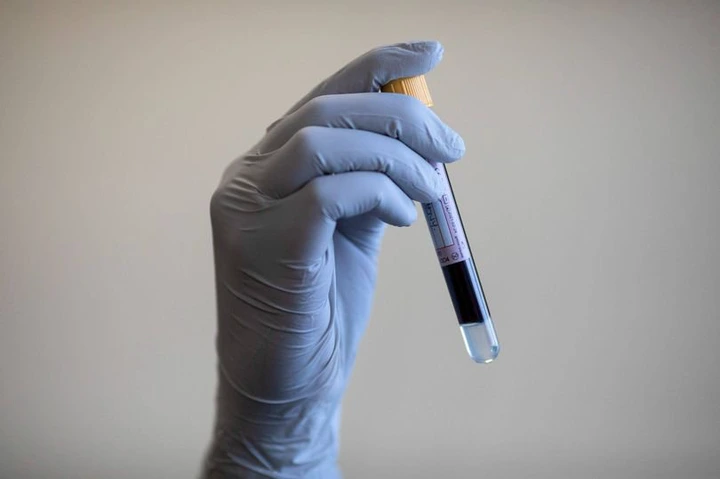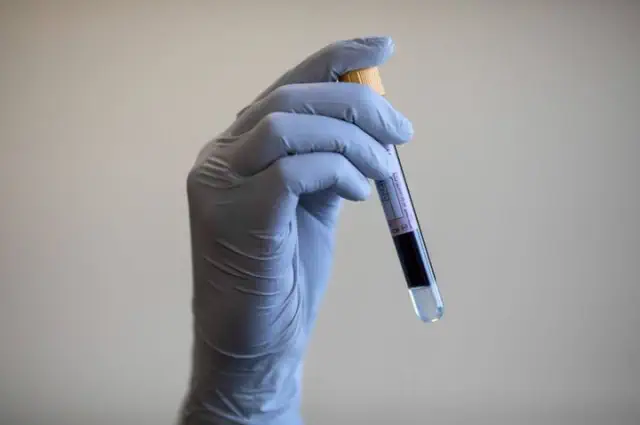A recent study has revealed that a blood test designed for individuals at elevated risk of lung cancer may facilitate earlier diagnosis and significantly decrease mortality rates.

View pictures in App save up to 80% data.
A recent study has shown that conducting blood tests on individuals who are at a heightened risk for lung cancer may significantly decrease mortality rates. Researchers at the University of St Andrews School of Medicine discovered that identifying biomarkers in the blood can facilitate earlier diagnosis of lung cancer, leading to a "substantial decrease in fatalities."
Lung cancer is typically diagnosed late when symptoms appear. That makes treatment less effective, with many patients having only a 10% chance of surviving five years post-diagnosis.
Researchers explained that biomarkers, such as proteins found in blood or urine, can reveal biological activity and potentially identify lung cancer prior to the onset of symptoms. Dr. Frank Sullivan, a professor of primary care medicine at the University, shared his insights on the findings that were published on Wednesday.
He remarked, "This research, alongside various studies employing imaging methods, indicates that we can now achieve earlier diagnoses of lung cancer. This is encouraging news, as detecting the disease at an earlier stage significantly increases the likelihood of success with the enhanced treatments currently on the market."
The team proposed that the biomarker test, which evaluates autoantibodies present in the bloodstream, could identify individuals who need a subsequent CT scan. Professor Sullivan informed the PA news agency: "The low-dose CT scan tends to over-diagnose, while the blood test can overlook some cancers. However, by combining the high sensitivity of one method with the high specificity of the other, we may find a practical solution."
The blood test is also a relatively straightforward method that "any laboratory anywhere in the world can do fairly cheaply", he added. The extensive trial included 12,208 smokers and ex-smokers aged between 50 and 75 who were at high risk of lung cancer, reports Surrey Live.
The study involved two groups of participants: one group was screened for abnormal autoantibodies using the EarlyCDT-Lung test biannually for a duration of two years, while the control group continued with standard clinical practice that did not include autoantibody testing. Both groups were observed over a period of five years.
The study revealed that deaths from any cause and specifically from lung cancer were significantly lower among those diagnosed within two years of their first EarlyCDT-Lung test compared to the control group. Out of the lung cancer cases detected during that period, there were 34 deaths in total, with 29 attributed to lung cancer in the tested group.
Conversely, the control group experienced 56 fatalities, 49 of which were attributed to lung cancer. Researchers indicate that this represents a 40% decrease in deaths from all causes, including lung cancer, for individuals who participated in the EarlyCDT-Lung test.
The researchers remarked: "Following a five-year period, there is a notable decrease in both all-cause mortality and lung cancer-specific mortality among patients who were screened for autoantibodies and subsequently diagnosed with lung cancer within two years of the screening. The autoantibodies identified through EarlyCDT-Lung appear to be particularly effective for identifying early-stage disease during the initial one to two years post-testing. In this study, the cancers found in individuals who tested positive were primarily at an early stage, allowing these patients to take advantage of the latest improvements in early-stage lung cancer treatment."
It was also noted that lung cancer treatment may become more affordable if the disease is detected at an early stage. The groundbreaking EarlyCDTLung Test is capable of detecting up to seven autoantibodies, and research groups around the world are developing additional biomarker tests that can use samples like hair and urine.
This comprehensive research involved a partnership between NHS experts and scholars from institutions in Dundee, Glasgow, Aberdeen, and Nottingham, resulting in a publication in the Plos One journal.










